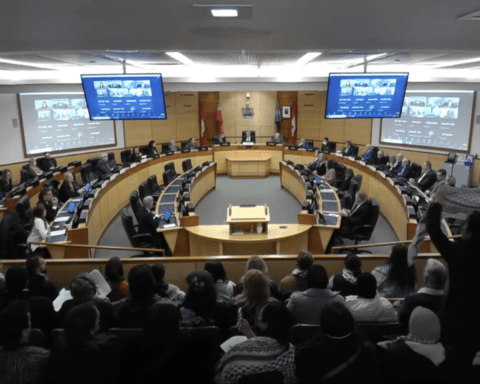Politically-mobilized diaspora communities have the potential to act as “spoilers’” in conflict resolution and post-war reconciliation in their home countries, Sri Lanka’s Ambassador to the UN in Geneva has said.
Ravinatha Aryasinha told the first-ever Diaspora Ministerial Conference in Geneva last week that Sri Lanka offered an instructive example, of both the scope as well as the complexities encountered in the nexus between diaspora, home state and host states.
Aryasinha’s warning came as the International Organisation for Migration said earning the trust of diaspora populations is the singular challenge it put before governments, organizations and others working with these communities.
“Knowledge about diasporas is not sufficient to foster collaboration; the foundation of effective engagement strategies is trust building,” a background paper for the conference said.
The Sri Lankan ambassador said politically mobilized pro-LTTE Tamil diaspora sustain hatred and prevent reconciliation and that meaningful engagement was not possible with groups having such a pre-disposition.
Noting that the transnational political opportunity structures prevalent in host states help shape and sustain such diaspora activism, Aryasinha said countries that continue to condone the hostility and disruptive tendencies shown by such elements are giving a wrong signal.
He cautioned that while in general the diaspora can play significant roles in developing their country of origin, in the case of countries that remain conflict affected or have recently emerged from protracted conflict, the academic discourse clearly demonstrates that diaspora are rarely autonomous actors.
They are known to be compelled by organized networks to fund, arm, engage in propaganda and be electoral vote blocks in host countries, there-by having the potential to act as “spoilers” in conflict resolution and post-conflict reconciliation in their home states.
He said there are ample instances where even when home states might want to end a conflict or pursue reconciliation, diaspora resist such moves, for it is not their sons and daughters who die, and often keeping the pot boiling in the home states helps them retain greater leverage, particularly in their quest to legally reside or gain citizenship in their host country.
Aryasinha said we should recognize the complexity of this challenge, acknowledge the pre-disposition among some diaspora categories to make meaningful engagement difficult, and try to explore modalities through which both home and host states could better influence diaspora in processes of conflict resolution, reconciliation and development in their home states.
Call for Jewish forum
In news about the actual Diaspora that lent the word to describe immigrant communities, the Jewish People Policy Institute recommended in its 2013 Annual Assessment that Israel should establish a forum for regular consultations to discuss matters that could affect Jewish communities worldwide. The Israel-based think tank presented its report in Jerusalem this week.
With regards to Jewish identity, the report states that programs like “Birthright” and “Massa” are having a positive effect on the younger generation, despite the trend of weakening identification of people of Jewish descent with the Jewish people.
“Today’s young generation sees the link with the Jewish People and the State of Israel as an option, for them this is a choice of being Jewish,” Einat Wilf, one of the reports contributors, said. “Despite the fact that the trend is negative, there are indications that this is changing, we see that the different programs are having an effect.”
Diaspora bonds planned
Money talks and bonds people together. The country which attracts the most remittances from its diaspora is planning to issue “diaspora bonds”.
India, which received $ 69 billion in remittances in 2012 [followed by China at $ 60 billion] as per a World Bank report, is considering the bonds to funds its infrastructure sector.
Overseas Indian Affairs Minister Vayalar Ravi said New Delhi is examining longer-term investment instruments for overseas Indians so that the community can participate and benefit from India’s “growth story”.
“The bulk of diaspora investments are in portfolio investments of a short-term nature. We are considering longer term investment instruments like ‘diaspora bonds’ to provide opportunities for overseas Indians,” Ravi told the 5th biennial Jamaican diaspora conference.
Overseas Indians worldwide are brand ambassadors and produce an economic output of about $ 400 billion, Ravi said. While India’s growth story so far has been driven primarily by its domestic industry, the diaspora holds far greater potential, he said.
“The cumulative Foreign Direct Investment (FDI) by Non Resident Indians is a modest $10 billion constituting less than five per cent of the total FDI in India,” he said. Lauding achievements of about 25 million overseas Indians spread across 130 countries, he said the community can serve as an “important bridge” between the “home” and the world.
Visa bonds decried
In news about another kind of bonds, a British proposal to slap £3,000 visa bonds for visitors from targeted non-white Commonwealth countries has attracted the expected flak.
The pilot scheme will initially cover India, Pakistan, Bangladesh, Sri Lanka, Nigeria and Ghana.
“They have been designated ‘high-risk’ countries, from which visitors aged over 18 on six-month visit visas will be forced to pay the £3,000 from November. The countries are being targeted by the Home Office because of the high volume of visitor visa applications and relatively high levels of fraud and abuse,” The Sunday Times newspaper said.
The plan was in disarray Monday after the Liberal Democrats, part of the ruling coalition, denied the policy had been formally agreed and Indian businesses accused Britain of discriminating against them.
The pilot scheme, announced over the weekend by the home secretary, forms part of wider Conservative Party efforts to bring down net migration to less than 100,000 by the next election.
As the coalition quibbled over the status of the policy, Indian business groups and would-be tourists responded with outrage to the idea.
The Confederation of Indian Industry (CII) was one of the first organizations to hit out, saying the bond was “highly discriminatory and very unfortunate.”
“The suggested changes are not only discriminatory they are also against the ‘special relationship’ publicised by the U.K. government,” a CII spokesperson said. “We share U.K.’s concern on illegal immigration but surely there are other more effective and non-discriminatory ways to put a check on it.”
On social media, a flurry of angry Tweets from Indians made pointed references to Britain’s two centuries of colonial rule over India, and suggested New Delhi impose a reciprocal measure on British visitors.
“UK wants a bond of £3,000 for a visa. We should do the same. Their citizens often overstay their welcome here,” Ian Pereira, a professional photographer, tweeted. — New Canadian Media




